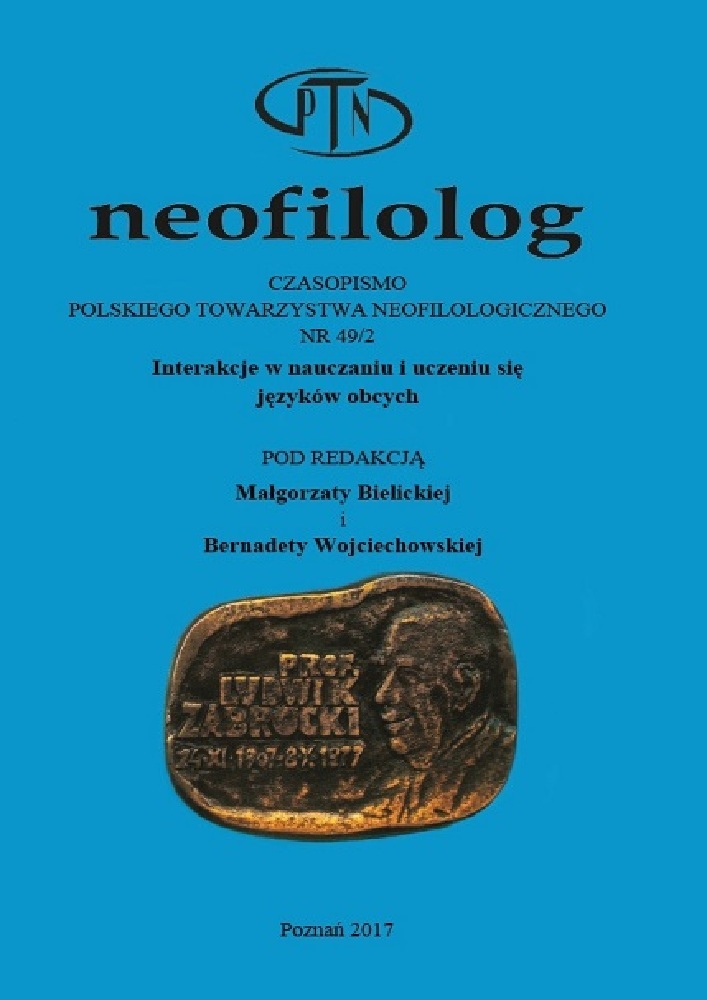Abstract
Interaction between the learner and teacher in the context of Foreign Language for Specific Purposes (FLSP) is characteristic in that often the learner has greater specialist knowledge than the teacher for reasons of experience, or because they work professionally in the field. The purpose of this article is to define the factors impacting on this relationship and analyze possible difficulties for the teacher. The empirical part describes a pilot study with the aim of analyzing responses from eight FLSP teachers.References
Dzięcioł-Pędich, A. 2016. „Online Forums as a Mirror Reflecting the World of ESP”. Journal of Language and Education, 2: 24-30.
Goodyear, P. 2005. „Educational design and networked learning: Patterns, pattern languages and design practice”. Australasian Journal of Education Technology, 21: 82-101.
Grucza, S. 2010. „Nowe platformy dydaktyczne: Lingwistyczne Inteligentne Systemy Translo- i Glottodydaktyczne (LISTiG)”. Lingwistyka Stosowna, 3: 167-178.
Grygiel, M. 2015. „In Search of a Theory of Business English”. (w) LSP Perspectives. (red. B. Borkowska-Kępska, G. Gwóźdź, P. Mamet). Dąbrowa Górnicza: Wydawnictwo Naukowe Wyższej Szkoły Biznesu w Dąbrowie Górniczej, str. 75-87.
Kic-Drgas, J. 2014. „Effective Business English Teaching and Learning”. Global Management Journal, 6: 82-87.
Mesh, L. J. 2010. „Collaborative language learning for Professional Adults”. Electronic Journal of e-Learning, 8: 161-172.
Rudnicka, A. i J. Reichel. 2016. „Edukacja w zakresie społecznych i ekologicznych aspektów zarządzania z wykorzystaniem pedagogiki aktywnego uczenia się i serious games”. (w) Języki specjalistyczne. Edukacja – Perspektywy – Kariera. (red. J. Makowski). Łódź: Wydawnictwo Wydziału Filologicznego Uniwersytetu Łódzkiego, str. 11-28.
Sowa, M. 2016. „Nauczyciel języka czy nauczyciel zawodu? Kompetencje nauczyciela języka specjalistycznego”. (w) Języki specjalistyczne w badaniach i praktyce. (red. J. Łącka-Badura). Katowice: Wydawnictwo Uniwersytetu Ekonomicznego w Katowicach, str. 139-157.
Szerszeń, P. 2014. Platformy (glotto)dydaktyczne. Ich implementacja w uczeniu specjalistycznych języków obcych. Warszawa: IKL@.
Ushioda, E. i Z. Dörnyei. 2012. „Motivation”. (w) The Routledgehandbook of second language acquisition. (red. S. Gass i A. Mackey). New York: Routledge, str. 396-409.
van de Bogart, W. 2009. Developing a Pedagogy for Active Learning (PAL). Part 1: Including a brief history of Active Learning in Thailand. Academic Journal Thammasat University. Bangkok. http://www.earthportals.com/Portal_Messenger/ActiveLearning.html [17.11.2017].
License
Copyright (c) 2017 Joanna Kic-Drgas

This work is licensed under a Creative Commons Attribution-NoDerivatives 4.0 International License.
Authors
Authors of texts accepted for publication in Neofilolog are required to complete, sign and return to the Editorial team’s office the Agreement for granting a royalty-free license to works with a commitment to grant a CC sub-license.
Under the agreement, the authors of the texts published in Neofilolog grant Adam Mickiewicz University in Poznań a non-exclusive, royalty-free license and authorize the use of Attribution-NoDerivatives 4.0 International (CC BY-ND 4.0) Creative Commons sub-license.
The authors retain the right to the free disposal of the work.
Users
Interested Internet users are entitled to use works that have been published in Neofilolog since 2017, under the following conditions:
▪ attribution – obligation to provide, together with the distributed work, information about the authorship, title, source (link to the original work, DOI) and the license itself.
▪ no derivatives – the work must be preserved in its original form. Without the author's consent, it is not possible to distribute the modified work in the form of translations, publications, etc.
Copyrights are reserved for all texts published since 2017.
Miscellaneous
Adam Mickiewicz University in Poznań retains the property right as a whole (layout, graphic form, title, cover design, logo etc.).
